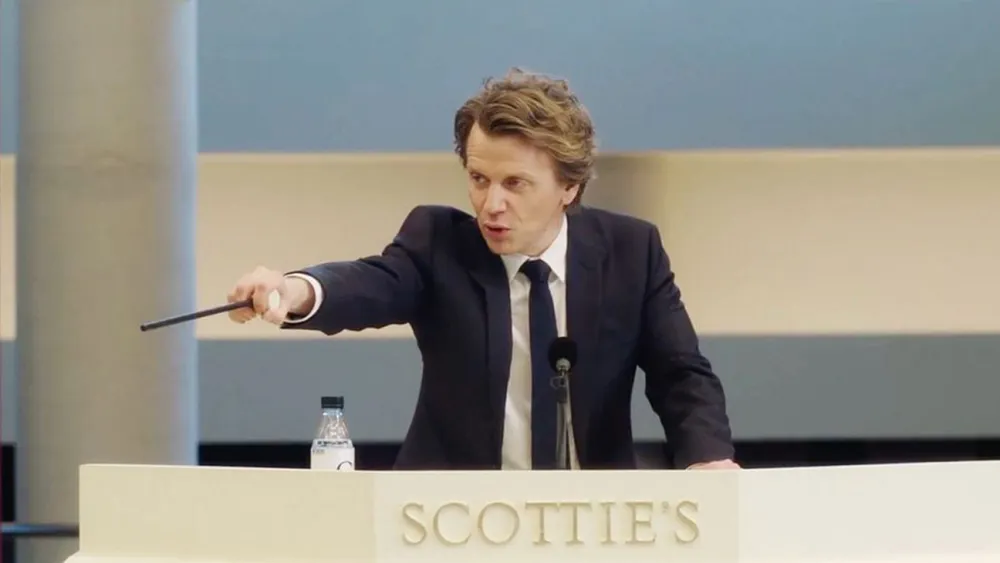Auction Review – Léa Drucker Shines in Pascal Bonitzer’s Witty Tale of Art, Class, and Greed
In the high-stakes world of fine art, a single painting can trigger fortunes, scandal, and legal maneuvering.
In the high-stakes world of fine art, a single painting can trigger fortunes, scandal, and legal maneuvering. It’s a universe where auction houses like Christie’s and Sotheby’s dominate, and ethics are often sidelined in favor of commission checks. Yet in Pascal Bonitzer’s latest feature, Auction (Le tableau voléau), morality manages to poke its head through the glitz — if only gradually.
Set in contemporary France, Auction is a crisp, clever dramedy that explores how a working-class family’s discovery of a long-lost Egon Schiele painting upends lives, ignites ambition, and exposes the tension between social class and wealth.

The Bottom Line:
Clever and entertaining, though slightly too neat in its resolution.
Release Date: Wednesday, Oct. 29
Cast: Alex Lutz, Léa Drucker, Nora Hamzawi, Louise Chevillotte, Arcadi Radeff, Laurence Côte, Alain Chamfort, Olivier Rabourdin
Director/Screenwriter: Pascal Bonitzer
Runtime: 1h 31m
A Painting That Shakes the Status Quo
The film kicks off with André (Alex Lutz), a Parisian commissaire-priseur at the fictional but plausibly elite Scottie’s auction house. André is a master of his craft — charismatic, calculating, and perpetually on the hunt for commissions — yet he operates in a world that tests both his professional skill and moral compass. In one opening scene, he deftly navigates the bigotry of a wealthy painting heir, showcasing his ability to survive and thrive in a ruthless market.
Enter Wilted Sunflowers, a 1914 Schiele painting with a complex past: originally owned by an Austrian Jewish collector forced to surrender it during the Nazi era, it eventually makes its way to Mulhouse, a working-class French town. There, a factory worker named Martin (Arcadi Radeff) discovers the painting tucked away in his modest family home, sparking a chain reaction of negotiations, rivalries, and unexpected alliances. Martin’s mother, played with warmth by Laurence Côte, adds a human touch to the tale of high-priced art.
Negotiating Art and Ethics
Much of the drama revolves around André’s navigation of both the art market and his own conscience. Lutz gives a finely tuned performance as a man who could easily be painted as greedy or manipulative, yet reveals depth beneath the ambition. He relishes the chance to broker the sale of the Schiele while still respecting the painting’s rightful heirs and balancing the demands of his money-focused employer.
André’s assistant, Aurore (Louise Chevillotte), is no passive sidekick. Her sharp wit and candid observations provide a counterpoint to André’s suave maneuvering. The dynamic between boss and assistant, layered with banter and subtle tension, becomes one of the film’s highlights.
Meanwhile, Bertina (Léa Drucker), André’s ex-wife and a fellow connoisseur of fine art, flits in and out of the story. While her subplot doesn’t carry significant weight, Drucker imbues the character with charm and subtle intelligence, adding texture to the narrative even when her presence is intermittent.
Class, Cunning, and the Lure of Money
Bonitzer, who has a storied history writing for directors like Jacques Rivette and André Téchiné, demonstrates a light, precise touch in Auction. Dialogue snaps with wit, and the narrative cleverly intertwines questions of social status, historical restitution, and financial incentive. However, the film occasionally undercuts its own tension: André faces remarkably little resistance in achieving his goals, leaving moments of potential drama underdeveloped.
Similarly, subplots involving Martin’s friends or Aurore’s family feel undercooked, contributing more to texture than to narrative propulsion. Yet the movie still succeeds as a moral fable of sorts, where human decency and professional integrity can coexist — even in a world dominated by high-priced art and cunning opportunists.
Research and Realism
Bonitzer’s devotion to authenticity shows in the film’s attention to detail. He consulted dozens of French art experts to capture the intricacies of provenance, auction practices, and valuation. Scenes set in Paris feel grounded, especially the sequences in the historic Drouot auction house, which has operated since the 1850s. The film’s locations give weight and texture to the story, making the world of art dealing feel lived-in and credible. Even small moments, like Aurore negotiating for a vintage coat, underscore the theme that cleverness and insight can yield rewards both large and small.
Auction isn’t a tense thriller, nor does it attempt to be. Instead, it’s a light, intelligent exploration of the intersections between wealth, social class, and human decency. Bonitzer, now 79, seems gentler than in some of his sharper, earlier works like Rien sur Robert (1999). Yet that mellowing lends the film its charm: it’s reassuring, even heartening, to watch characters act with integrity in a setting where greed often rules.
At its core, Auction is about more than a painting. It’s a story about values, human connection, and the moments when morality can triumph over opportunity — even if just enough to make the art world a little less ruthless.
